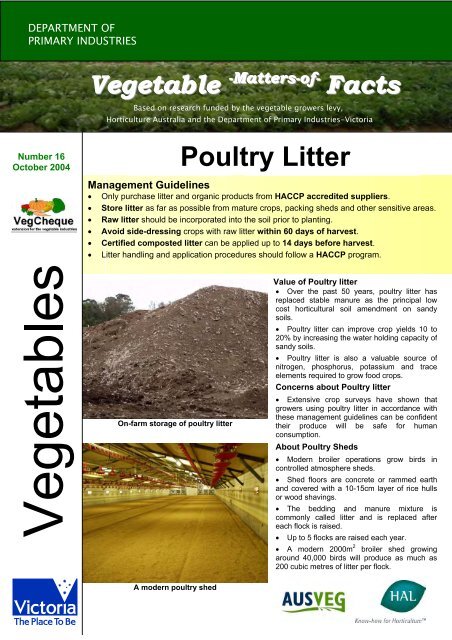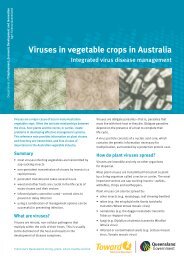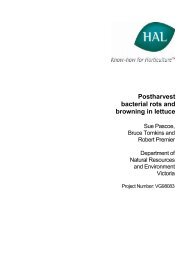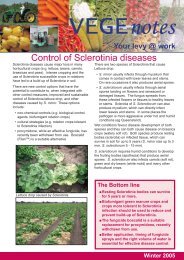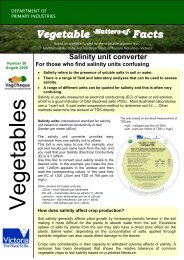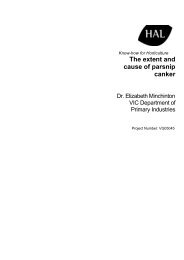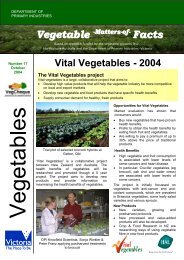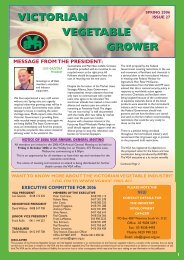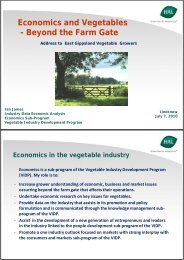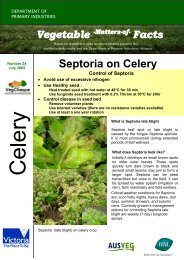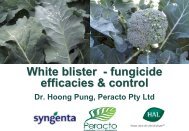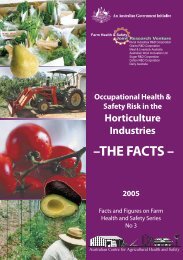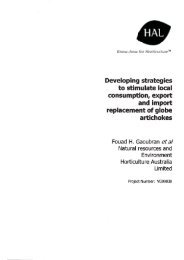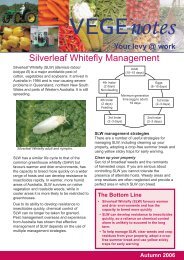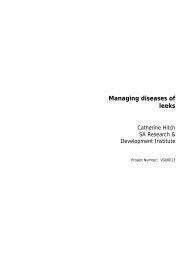No.16 download pdf 147kb - Vegetable Growers Association of ...
No.16 download pdf 147kb - Vegetable Growers Association of ...
No.16 download pdf 147kb - Vegetable Growers Association of ...
You also want an ePaper? Increase the reach of your titles
YUMPU automatically turns print PDFs into web optimized ePapers that Google loves.
DEPARTMENT OF<br />
PRIMARY INDUSTRIES<br />
<strong>Vegetable</strong> - -Matters--<strong>of</strong>-- Facts<br />
Based on research funded by the vegetable growers levy,<br />
Horticulture Australia and the Department <strong>of</strong> Primary Industries-Victoria<br />
Number 16<br />
October 2004<br />
Management Guidelines<br />
Only purchase litter and organic products from HACCP accredited suppliers.<br />
<br />
<br />
<br />
<br />
<br />
Poultry Litter<br />
Store litter as far as possible from mature crops, packing sheds and other sensitive areas.<br />
Raw litter should be incorporated into the soil prior to planting.<br />
Avoid side-dressing crops with raw litter within 60 days <strong>of</strong> harvest.<br />
Certified composted litter can be applied up to 14 days before harvest.<br />
Litter handling and application procedures should follow a HACCP program.<br />
On-farm storage <strong>of</strong> poultry litter<br />
Value <strong>of</strong> Poultry litter<br />
Over the past 50 years, poultry litter has<br />
replaced stable manure as the principal low<br />
cost horticultural soil amendment on sandy<br />
soils.<br />
Poultry litter can improve crop yields 10 to<br />
20% by increasing the water holding capacity <strong>of</strong><br />
sandy soils.<br />
Poultry litter is also a valuable source <strong>of</strong><br />
nitrogen, phosphorus, potassium and trace<br />
elements required to grow food crops.<br />
Concerns about Poultry litter<br />
Extensive crop surveys have shown that<br />
growers using poultry litter in accordance with<br />
these management guidelines can be confident<br />
their produce will be safe for human<br />
consumption.<br />
About Poultry Sheds<br />
Modern broiler operations grow birds in<br />
controlled atmosphere sheds.<br />
Shed floors are concrete or rammed earth<br />
and covered with a 10-15cm layer <strong>of</strong> rice hulls<br />
or wood shavings.<br />
The bedding and manure mixture is<br />
commonly called litter and is replaced after<br />
each flock is raised.<br />
Up to 5 flocks are raised each year.<br />
A modern 2000m 2 broiler shed growing<br />
around 40,000 birds will produce as much as<br />
200 cubic metres <strong>of</strong> litter per flock.<br />
A modern poultry shed
Safe <strong>Vegetable</strong> Production<br />
“A Microbial Food Safety Guide<br />
for the Australian <strong>Vegetable</strong> Industry”<br />
VG 98093 - April 2002<br />
Food safety and quality assurance systems have become<br />
common place in the vegetable industry. In many cases<br />
they are essential to supply particular customers.<br />
In the past there has been considerable confusion in<br />
horticultural industries with regard to some <strong>of</strong> the technical<br />
aspects <strong>of</strong> on-farm food safety, as well as inconsistencies<br />
in the way systems were implemented and audited.<br />
DPI scientists in collaboration with an industry working<br />
group have prepared these practical guidelines to aid the<br />
industry in developing, implementing and auditing QA<br />
systems.<br />
These guidelines maintain vegetable quality and<br />
environmental standards without sacrificing the value <strong>of</strong><br />
poultry litter as a soil amendment. <strong>Growers</strong> are<br />
encouraged to adopt these practices to ensure the<br />
continued safe use <strong>of</strong> poultry litter in vegetable<br />
production.<br />
For more information please contact:<br />
Robert Premier<br />
DPI - Knoxfield 03 9210 9222<br />
Are you on our mailing list?<br />
If you would like to receive your own copy <strong>of</strong> <strong>Vegetable</strong><br />
Matters-<strong>of</strong> -Facts or have changed your address, please<br />
mail or fax this coupon to:<br />
Craig Murdoch, Private Bag 15, Ferntree Gully<br />
Delivery Centre 3156; Fax (03) 9800 3521.<br />
Name: ________________________________________<br />
Address: ______________________________________<br />
Postcode___________ Email _____________________<br />
Organisation/Business ___________________________<br />
Crops <strong>of</strong> interest_________________________________<br />
“Strategies for the safe use <strong>of</strong> poultry<br />
litter in food crop production”<br />
VG 01049 - September 2003<br />
Food safety and poultry litter<br />
<br />
<br />
A 2-year survey <strong>of</strong> local farms using poultry litter<br />
incorporated into soil prior to planting, did not<br />
detect any human pathogenic (disease causing)<br />
bacteria on any harvested leafy crops.<br />
Detection <strong>of</strong> E. coli and human pathogens in raw<br />
litter is difficult because their occurrence is so<br />
rare and patchy. It is like looking for “ a needle in<br />
a haystack”.<br />
AGED litter is not COMPOST<br />
Composting involves rapid decomposition<br />
producing a product with coliform counts similar<br />
to that found in soil - less than 100/g. This is<br />
achieved through a stringently controlled and<br />
audit-certified process - Australian Standard AS<br />
4454-2003.<br />
Ageing litter even for 12 weeks only marginally<br />
improved its hygienic condition. Turning the heap<br />
on farm was also ineffective. The process <strong>of</strong><br />
ageing is too slow to prevent continual recontamination<br />
and persistence <strong>of</strong> bacteria on the<br />
outside <strong>of</strong> the litter pile.<br />
Whilst controlled composting will undoubtedly<br />
produce the safest product from poultry litter, our<br />
results suggest that it is not necessary to use<br />
composted litter for all applications.<br />
For more information please contact:<br />
Kevin Wilkinson<br />
For more information please contact your<br />
local VegCheque <strong>of</strong>ficer.<br />
Neville Fernando Gippsland 5152 0600<br />
Sally-Ann Henderson Northern Vic 5051 4500<br />
Bruce Fry South West Vic 5233 5510<br />
Craig Murdoch Melbourne 9210 9354<br />
Useful Websites for more information:<br />
http://www.ext.vt.edu/pubs/poultry/424-034/424-034.html<br />
http://muextension.missouri.edu/xplor/envqual/wq0212.htm<br />
Check us out and view our other fact sheets at:<br />
http://www.dpi.vic.gov.au/agvic/ihd/projects/vchq.htm<br />
<strong>Vegetable</strong> Matters-<strong>of</strong>-Facts is published as part <strong>of</strong> DPI’s VegCheque extension program.<br />
Editor: Rob Dimsey, 03 5152 0600<br />
Disclaimer: This publication may be <strong>of</strong> assistance to you but the state <strong>of</strong> Victoria and its employees do not guarantee that the publication<br />
is without flaw <strong>of</strong> any kind or is wholly appropriate for your particular purpose and therefore disclaims all liability for any error, loss or<br />
other consequences which may arise from you relying on any information in this publication.<br />
The State <strong>of</strong> Victoria, Department <strong>of</strong> Primary Industries, 2003. ISSN: 1445-5676


